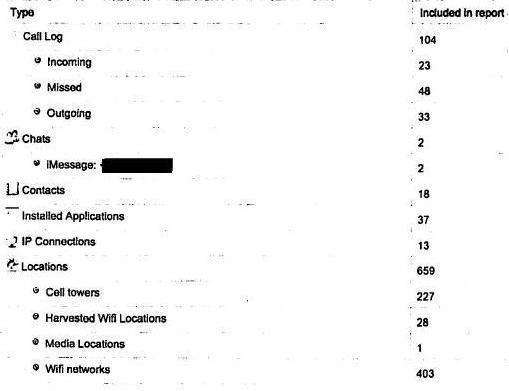Smartphones such as Apple's iPhone have turned into indispensable aspects in their users' lives, but a recently discovered court document demonstrates how authorities can use the seemingly innocuous devices as remarkably detailed tracking tools.

The American Civil Liberties Union recently uncovered a court document connected to a drug investigation conducted by U.S. Immigration and Customs Enforcement (ICE). The document (available here) contains a detailed list of the information federal agents were able to extract from one suspect's iPhone during a single data extraction session.
The list includes call logs, iMessage and chat data, contact information, installed applications, stored voicemails, passwords, and IP connection data. It also has information on 659 geolocation points, including the cell phone towers and Wi-Fi connections the iPhone had connected to.
At issue is the legal standard for conducting this sort of deep examination of mobile handsets. Given the massive amount of personal information users now keep on smartphones and similar devices, the ACLU argues that law enforcement should have to obtain a warrant in order to perform this type of search. In the example provided, federal agents first obtained the iPhone in the course of a warranted search, then secured another warrant before scanning the phone.

List of data points recorded from the extraction session.
"The type of data stored on a smartphone," the ACLU argues, "can paint a near-complete picture of even the most private details of someone's personal life."
The report says that standards governing cell phone searches are not solid, and that courts disagree on whether law enforcement should have to obtain a warrant. Reportedly, there have been many instances — in searches incident to arrest as well as cases originating at the U.S. border — where police have argued they do not need to obtain a warrant.
In order to avoid such warrantless searches, the ACLU recommends setting a long password — not a four-digit PIN code — to lock a device. The organization also recommends against relying on the pattern-based lock system common to Android devices, as Google can bypass such security measures if it is forced to do so by the government.